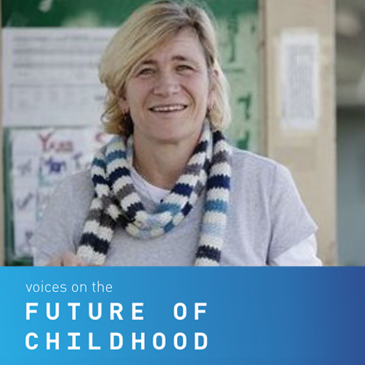For Part 3 of the Voices on the Future of Childhood series, we asked experts to offer their insights and predictions on what play will—or better yet, should—look like when families are released from isolation.
Why play will be essential when we reopen schools
 Jill Vialet is the Founder of Playworks, Co-Founder of MOCHA, Substantial, and Workswell, the author of Recess Rules, and co-author of the forthcoming Substantial: Redesigning the Substitute Teaching Experience from Jossey-Bass. Playworks has just launched #PlayAtHome resources for families, featuring live recess sessions on Facebook.
Jill Vialet is the Founder of Playworks, Co-Founder of MOCHA, Substantial, and Workswell, the author of Recess Rules, and co-author of the forthcoming Substantial: Redesigning the Substitute Teaching Experience from Jossey-Bass. Playworks has just launched #PlayAtHome resources for families, featuring live recess sessions on Facebook.
While health officials still need to determine when schools will reopen, educators have begun turning their attention to how schools might look when such re-openings begin to occur. And one thing is clear: when kids return to school, they’re going to need a way to have social connections while maintaining physical distancing. Eliminating play and physical activity from their days—especially eliminating recess —is going to have the exact opposite effect of what is needed. Instead, looking at intentionally designing play activities that promote physical distancing, encourage hand washing, and promote youth leadership represents a singular opportunity to leverage students’ intrinsic motivation to cooperate by using one of the oldest parenting/teaching tricks in the book: turn it into a game. In whatever schedule configurations that emerge, having staff who can support small group, student-led play and physical activities will be essential to reopening schools that work.
Further, conversations about the post-COVID-19 learning losses as something equivalent to a super “summer slide” set up a potentially dangerous dynamic around academic remediation that is doomed from the start. The long and short of it is that academic remediation doesn’t work, but accelerating learning can. Dr. Will Massey’s research found that high quality recess was associated with improved executive functioning, emotional self-control, resilience, and positive classroom behavior in elementary school children—all essential preconditions for accelerated learning amongst the age group that is most likely to have experienced the greatest learning losses.
If COVID-19 has done nothing else, it has laid bare the messiness and inevitability of our interdependence. Play’s future is deeply rooted in its past: a risky behavior that has nonetheless survived eons of evolution precisely because it teaches us to navigate the demands of social connection.
See more posts in this series:
Voices on the Future of Childhood
Bo Stjerne Thomsen | Helen Hadani | Jill Vialet | Kathy Hirsh-Pasek | Kathryn E. Ringland |
Makeda Mays Green | Roger Hart | Ronda Jackson | Rosanna Lopez


